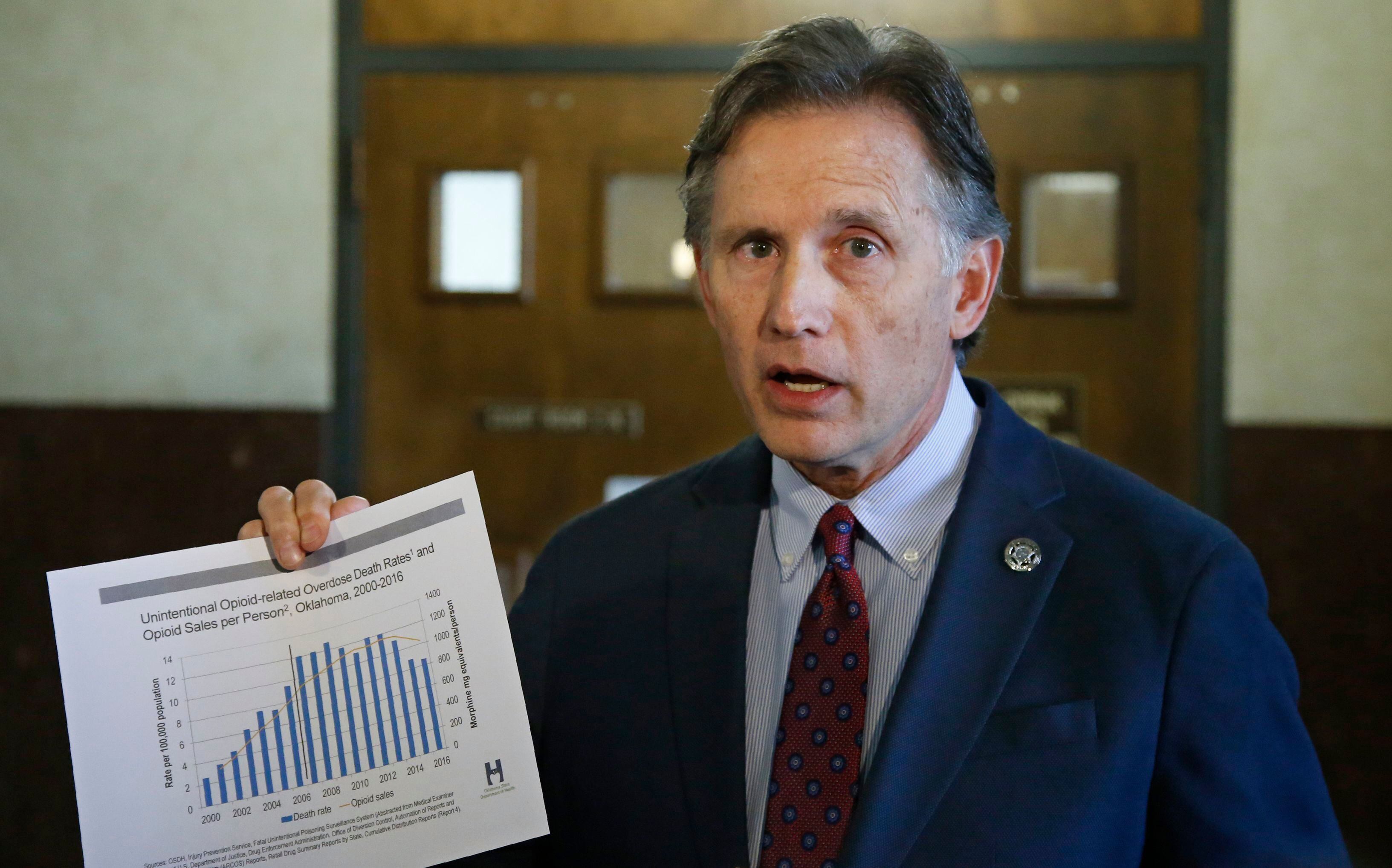An Oklahoma judge ruled that Johnson & Johnson is at fault for fueling the state's opioid crisis, ordering the major U.S. conglomerate to pay over $570 million in damages — a far cry from the $17 billion requested.
The actions of Johnson & Johnson "compromised the health and safety of thousands of Oklahomans," said Cleveland County District Judge Thad Balkman while announcing the decision Monday. "The opioid crisis has ravaged the state of Oklahoma and must be abated immediately."
The landmark case was spearheaded by Attorney General Mike Hunter who argued that Johnson & Johnson ($JNJ) was the "kingpin" behind the state's opioid crisis. The government claimed that the company spread dangerous opioids through misleading marketing and unfair sales practices, and initially requested Johnson & Johnson to pay $17 billion over three decades to help fund treatment care and social services. Balkman said the multi-million damages payout was the highest he could go based on the case's findings.
The drugs in the case included two painkillers and a fentanyl skin patch that were sold by Janssen Pharmaceuticals, a Johnson & Johnson subsidiary. The company denied all wrongdoing throughout the months-long trial and said it will appeal the decision.
"Janssen did not cause the opioid crisis in Oklahoma, and neither the facts nor the law support this outcome," Michael Ullmann, Johnson & Johnson's executive vice president and general counsel, said in a statement. "We recognize the opioid crisis is a tremendously complex public health issue, and we have deep sympathy for everyone affected. We are working with partners to find ways to help those in need."
Yet the opioid crisis, Balkman stressed, has become an "imminent danger and menace to Oklahomans."
Monday's ruling is just the latest example of the government's — and American people's — increasing willingness to hold pharmaceutical companies responsible for the nation's opioid epidemic, which accounted for 68 percent of all fatal drug overdoses in 2017. Aside from the nearly 48,000 deaths annually, the Centers for Disease Control and Prevention estimates that the total "economic burden," which includes healthcare costs, lost productivity, and criminal justice costs, of opioid addiction in the U.S. is $78.5 billion a year.

In May, a federal jury in Boston found multiple executives at Insys Therapeutics guilty of paying off doctors to prescribe the fentanyl-based painkillers and of other racketeering practices. The company later filed for bankruptcy protection after agreeing to pay a $225 million settlement.
Balkman's decision is also just the latest victory in Oklahoma's fight against opioid producers. In March, Hunter secured a $200 million settlement with Purdue Pharma — the same company that was also forced to pay over $634 million in fines in 2007 for misbranding OxyContin. The settlement will be used to fund addiction treatment initiatives at Oklahoma State University.
The state also negotiated in June an $85 million settlement with Israel-based Teva Pharmaceuticals over nefarious marketing and sales practices.
In the case against Johnson & Johnson, the state's lawyers substantiated claims that the company had downplayed the strength and addictiveness of their painkillers, instead marketing them as "safe and effective for everyday pain." Sales representatives also systematically targeted doctors to encourage the use of their opioids for the broadest of ailments, and used specific strategies to sell to certain groups such as women and veterans.
"The evidence is clear that they must be held accountable for the public nuisance they caused and ordered to abate it," Hunter said in July when the trial closed. "Perhaps most offensive … is that Johnson & Johnson's corporate representative, while on the stand, said the company bears zero responsibility for the death and destruction it has caused."
A recent survey conducted by Ipsos and NPR found that the American public largely supports holding opioid producers accountable for the crisis.
A 56 percent majority said that pharmaceutical companies should be held responsible for making the opioid abuse worse, and roughly 75 percent of respondents said those companies should fund addiction treatment programs as well as pay for the distribution of naloxone, a medication that can reverse overdoses from opioids.








